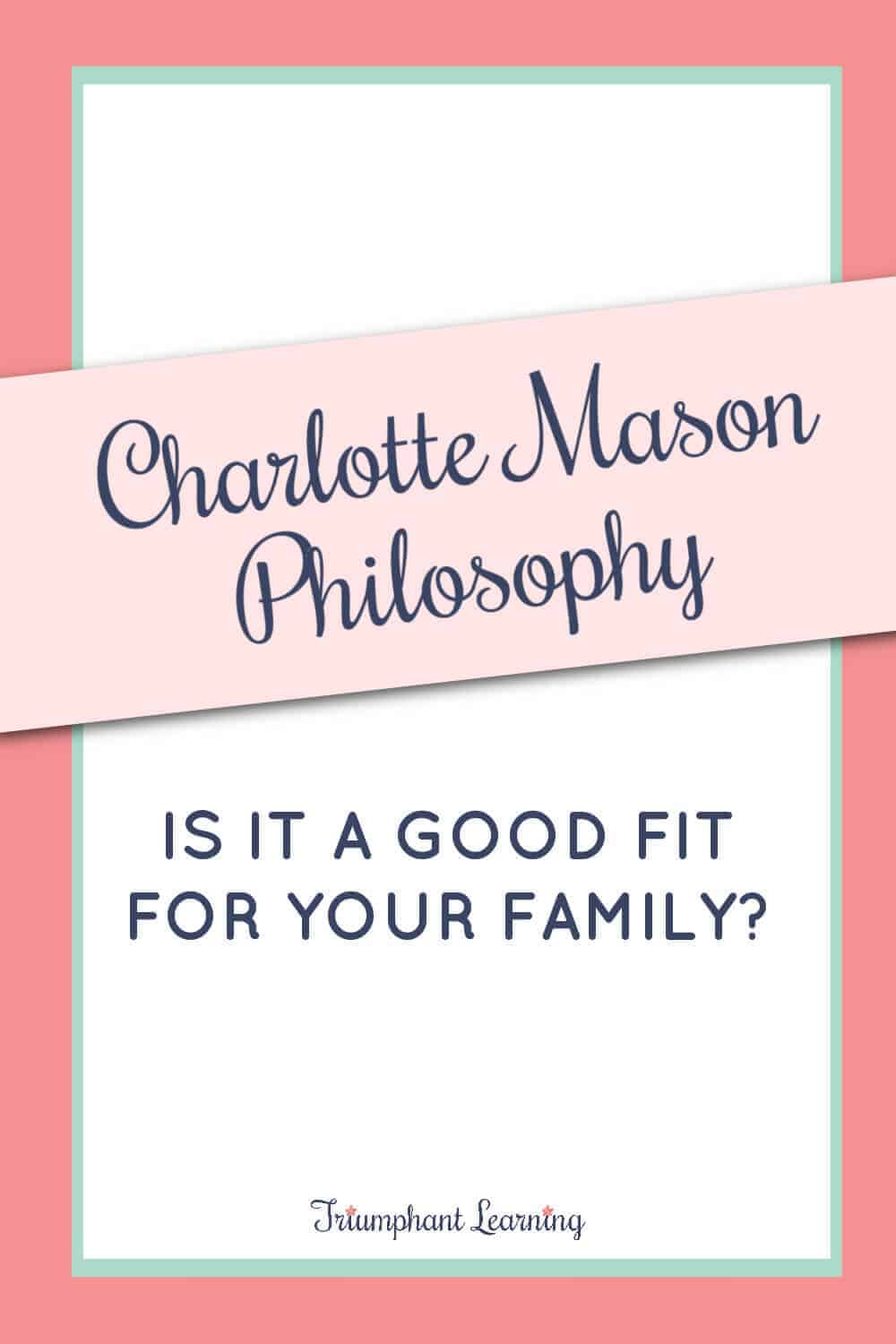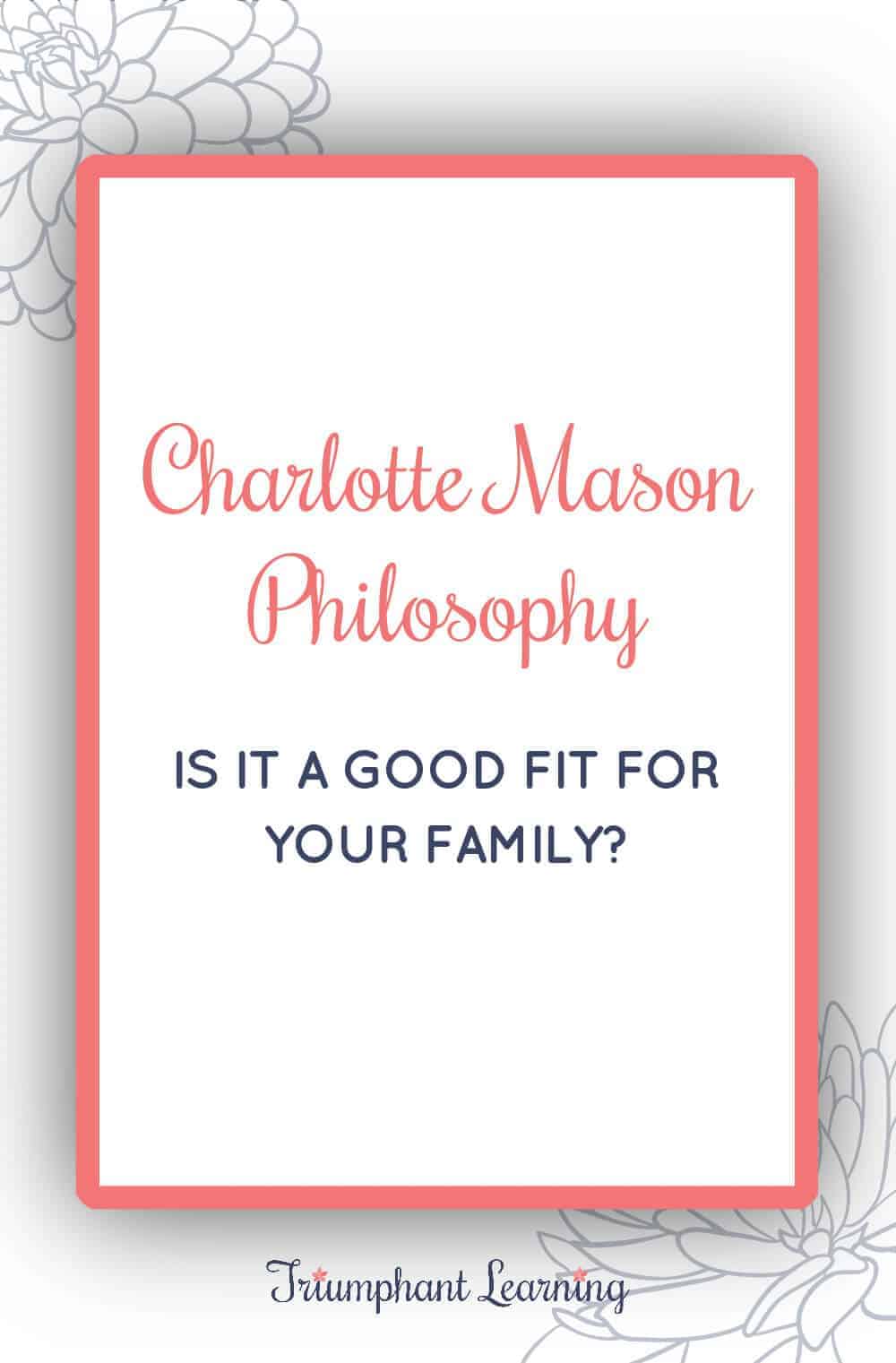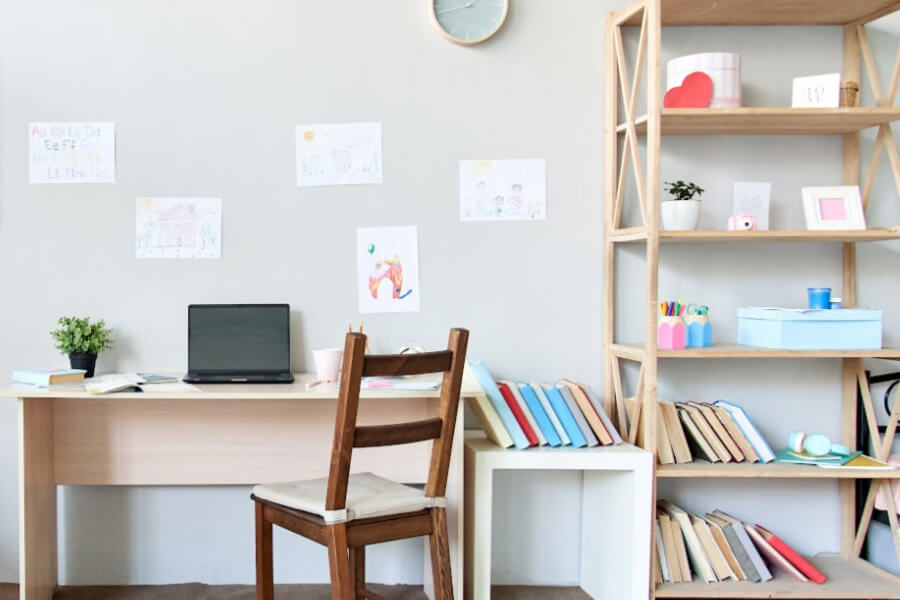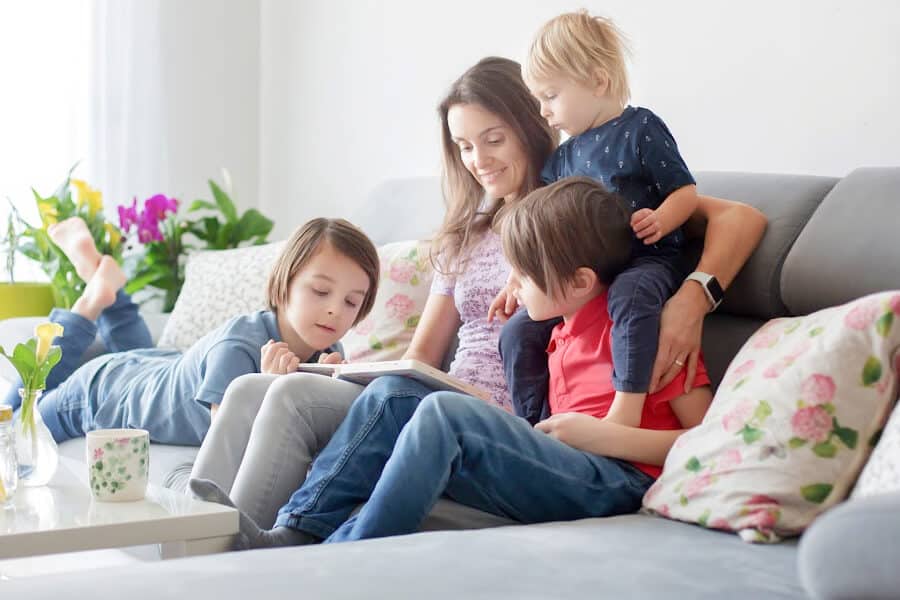Charlotte Mason Philosophy: Is It A Good Fit For Your Family?
Preview: Learn how to know if the Charlotte Mason philosophy is a good fit for your family and practical tips to help you get started.
Homeschool parents have to make many decisions in their first few years of homeschooling. Choosing the educational philosophy to follow and the curriculum to use is often the most stress-inducing decision they make.
How do you know if the Charlotte Mason philosophy is a good fit for your family? And if it is, how do you get started?

In this article, you will learn the answers to these questions and find practical tips to help you implement the Charlotte Mason philosophy.
Quick Navigation
What is the Charlotte Mason Philosophy?
The Charlotte Mason philosophy is based on the philosophy of education developed by Charlotte Mason (1842-1923), an educator in England. She advocated that children are born persons and can make connections at all ages with what they learn and with authors they read.
Homeschools that employ this philosophy focus on academics, character development, habit training, and spiritual discipleship. They utilize living books, source documents, hands-on experiences, and exposure to nature and the arts. Evaluation occurs through oral narrations and, later, written narrations and essays.
Strengths
- Trains children to think critically and to communicate their thoughts and ideas to others.
- Provides a liberal arts education by including enrichment subjects that bring joy and beauty to learning.
- Encourages a child to achieve excellence instead of merely completing an assignment or passing a test.
- Encourages a child to assume responsibility for his education.
- Many lessons can be completed together as a family.
- Encourages children to become lifelong learners who know how to learn independently and learn for the sake of learning.
- Advocates training the whole child—body, mind, spirit, and soul—to develop his character.
- Rigorous academic training appropriate for a child’s developmental level.
Weaknesses
- Unless using a boxed curriculum, it can be time-intensive to plan and implement.
- Very few boxed curriculums are available, although more are published every year.
- Difficult to provide “grades.” Most families employ a “mastery-approach” to learning and evaluation.
- It can be challenging to record learning and meet reporting requirements in highly regulated states.
Why we use the Charlotte Mason philosophy.
Our oldest child was two when we decided to homeschool. For the next several years, I read everything I could about home education, including curriculum options and philosophies of education. I was drawn to three: Charlotte Mason, Classical, and Thomas Jefferson education. They all had similarities, the most notable being their focus on using books.
As I learned more about each philosophy, I gravitated toward the Charlotte Mason method. Listed below are the top reasons why we use the Charlotte Mason philosophy.
Prefer to listen or want to learn more? In episode 68 of the All in a Homeschool Day podcast, I discuss these reasons in more detail.
Charlotte Mason believed children were born persons.
From the day they are born, children begin learning and forming connections with the world around them. They are capable of investigating, learning, understanding, and forming opinions, even if their understanding is not as deep or complex as that of an adult.
Charlotte Mason encouraged parents and teachers to provide many learning opportunities from nature and high-quality books. She advocated for them to step out of the way of their children’s learning. Instead of lecturing, Ms. Mason wanted children to experience the world for themselves and form their own impressions.
A Charlotte Mason education provides a broad and generous education.
A Charlotte Mason education encompasses more than the 3 Rs. We cover a wide variety of subjects during any given week. My goal is not to teach my children everything they need to know but to provide opportunities for them to learn places, people, and, most importantly, ideas. These ideas will shape their life and character.
You can shape your child’s character.
The goal of education should not be to fill a child’s mind with facts. The ancient classical model of education used methods of learning to shape a person’s character. Through a Charlotte Mason education, we can focus on more than academics. We can develop good habits and shape our children’s character through the books we read.
Children learn how to think.
Using narration, my children learn how to read for understanding, analyze the passage, evaluate it, and form their own opinions. Through this process, they acquire critical thinking skills. They also learn how to synthesize information from multiple sources to support their views.
My children are not the only ones who benefit in this way. Through my educational experience, I learned to read to complete a book, and study to pass a test. As I incorporated narration with my reading, I saw my understanding deepen. I learned how to think too!
Children learn in a developmentally appropriate way.
Charlotte Mason’s methods recognized that children need different approaches at different stages. While she believed children are born persons, she also recognized that their brains develop over time. Each of her methods utilizes the strengths of a child’s developmental stage to help him progress to the next level.
I can meet the needs of each child.
A significant theme throughout Charlotte Mason’s The Original Homeschooling Series is being a student of your child. She encouraged parents and teachers to observe and know their child, thus allowing parents to provide what a child needs to thrive.
I can provide a customized education for each of my daughters. I have a struggling learner and a gifted learner. Their academic, social, and emotional needs are different. Even though I implement the same methods with each of them, their education looks different.
We can learn by reading living books.
As a bibliophile, this point was particularly appealing to me. I could teach my children by reading books! What could be better?
We can learn about people, events, and places through an engaging story. As we hear about a character’s struggles and how he overcomes them, we learn how to apply the principles and character qualities to our lives. We see how history is not as simple as many textbooks present. Many factors influenced the choices people made in the past.
And because a story is more engaging than learning dry facts, my children remember what they read.
Children form relationships through experiences.
A child who only learns from a book does not have the depth of understanding as one who also learns from personal experience. When children explore nature, take field trips, and experiment with real objects, they have a deeper understanding than simply reading about them in a book.
It aligns with our Christian worldview.
Charlotte Mason was a Christian, and her faith is evident in her books, The Original Homeschooling Series. Her Christian faith heavily influenced her understanding and view of education. That is one aspect that drew us to this philosophy.
With that said, many non-religious families and families of other faiths use the Charlotte Mason philosophy. This philosophy is easily customized to meet the needs of your family.
In the “Five Principles That Have Most Impacted Our Homeschool” master class, I expand on five of these reasons.
What does a day in a Charlotte Mason homeschool look like?
So what does a day look like for us?
No two are exactly alike, but there is a rhythm to our days. Each year is slightly different as I plan the school year according to my children’s needs and our family’s schedule.
The following are common themes you’ll see throughout our homeschool journey.
- Our school days are finished by noon in elementary school and shortly after lunch in middle school and high school.
- Short lessons help develop my children’s ability to pay attention.
- We cover various subjects throughout the week, but because each lesson is short, our schedule does not feel overwhelming.
- Most days, we have family time where we learn together and discuss what we learned.
- We are intentional in developing good habits. Some days, we lay school lessons aside to address character issues.
- We spend as much time outside as possible, including doing schoolwork out of doors, going on nature walks, and playing outside.
- All subjects incorporate living books and narration.
We can get so consumed by what others tell us education should look like for our children that we forget education can be living and joyful. Crystin Morris of Delightfully Feasting reminds us that when we spend time developing our relationship with our children and cherishing the time we have with them we can embrace the principles and educational philosophy we are learning about and implementing in our homes more organically. She shares with us what this might look like during the preschool years and beyond.
Who should consider using the Charlotte Mason philosophy?
Listed below are some reasons you might consider using this method of home education.
- You would like your family to learn together for at least some subjects.
- You desire to provide a broad and varied curriculum for your children.
- You want to train your children to think.
- You desire to raise lifelong learners who can learn on their own and enjoy learning.
- You want to educate the whole child in a rigorous and developmentally appropriate manner.
- Your child is a visual, auditory, or kinesthetic learner.
The Charlotte Mason philosophy is a good fit for many families, but it is not right for everyone. If this does not sound like it would be a good fit for you, you can learn about other homeschool philosophies on
Learn how to get started with the Charlotte Mason philosophy.
Are you ready to implement the Charlotte Mason philosophy? Here are some tips to help you get started.
Make sure you have a solid homeschool foundation.
If you have not written out a homeschool mission statement, do that first! Knowing your homeschool goals will help you make a plan that is right for your family. You can avoid some of the doubt and fear because you’ll know you are doing what you need to do to achieve your goals.
Learn more about the Charlotte Mason philosophy.
Charlotte Mason wrote six volumes about her educational philosophy. I don’t know about you, but when I first started learning about this method of education, I was a little overwhelmed and wondered how to get started.
From the little research I had done, I knew the main points of her philosophy were to create “an atmosphere, a discipline, a life” where children would learn and grow in character. But what did that look like exactly? And in the twenty-first century (instead of Victorian England)!
I knew I wanted to read all of her Original Homeschooling Series eventually, but I knew I wouldn’t have time to read all six volumes before I started teaching my children. I was so thankful to have several cliff notes versions to give a brief overview of the philosophy so I could get started right away.
Books (In Brief) About The Charlotte Mason Philosophy
- A Charlotte Mason Education by Catherine Levison
- Charlotte Mason Homeschooling in 18 Easy Lessons by Cindy West
- More Charlotte Mason Education by Catherine Levison
Ease into it.
I knew I couldn’t implement all aspects of Charlotte Mason’s methods at once. I didn’t understand all of them, not to mention that we were still trying to get our bearings homeschooling.
Not knowing what else to do, I started implementing one aspect of the Charlotte Mason philosophy at a time. When I felt confident with one part of the philosophy, I added another one.
Before I knew it, we were a Charlotte Mason homeschool! (Well, I’ll admit, I’m not a Charlotte Mason purist. Just as Ms. Mason did so many years ago with other educational philosophies, I tweak many aspects of her philosophy to meet the needs of my students.)
If you are unsure what to implement first, Cindy West has broken the process down in Charlotte Mason Homeschooling into 18 easy lessons. There are two things I love about this book.
- Cindy shares stories about how she implemented the Charlotte Mason method in her homeschool, making it work for her children. Seeing how this looked in a real homeschool is helpful and encouraging. It makes implementing the Charlotte Mason method seem attainable in any homeschool.
- At the end of each chapter, she includes a “homework” suggestion to help you implement that aspect of the philosophy. Don’t worry, it’s not difficult or time-consuming! It’s merely a challenge to find a way you can make one small change over the next week.
Continue learning.
Charlotte Mason was a lifelong learner. She read about a wide range of topics and read a lot, and she encouraged the teachers at her training college to do the same. There is always more we can learn.
Some of the topics you could learn about include:
- Educational philosophies
- Homeschool topics
- Child development
- History
- Geography
- Faith
- Biographies
- Personal development
- Personal interests and hobbies
Books To Learn More About Charlotte Mason’s Methods
- Original Homeschooling Series by Charlotte M. Mason
- For the Children’s Sake by Susan Schaeffer Macaulay
- Know and Tell: The Art of Narration by Karen Glass
- Consider This: Charlotte Mason and the Classical Tradition by Karen Glass
- The Living Page: Keeping Notebooks With Charlotte Mason by Laurie Bestvater
Consider joining a support group.
It is important to have regular fellowship with like-minded homeschool families. The homeschool journey is more enjoyable, fruitful, and sustainable when we support one another.
A Charlotte Mason Discussion Group was an incredible encouragement for me.
- When I needed assistance finding books to read for a specific subject, other moms had suggestions.
- When I needed help understanding how to implement different subjects or aspects of the philosophy, our discussions of Charlotte Mason’s methods were invaluable.
- When I just needed someone to listen, they were there.
If there is no Charlotte Mason Discussion Group in your area, I encourage you to consider starting one.
Take a deep breath.
Homeschooling can feel overwhelming, but remember that you are your children’s best teacher!
- You know your children best.
- You’ve been teaching them since the day they were born.
- You love your children and want the absolute best for them.
You can do this!
And if you feel like you need a little help, reach out and let me know. I love coaching homeschool parents to help them homeschool with confidence and joy.
With personalized coaching, we can work together to identify obstacles and make a plan to overcome the roadblocks keeping you and your children stuck so that you can achieve your homeschool goals and enjoy your homeschool experience.

















